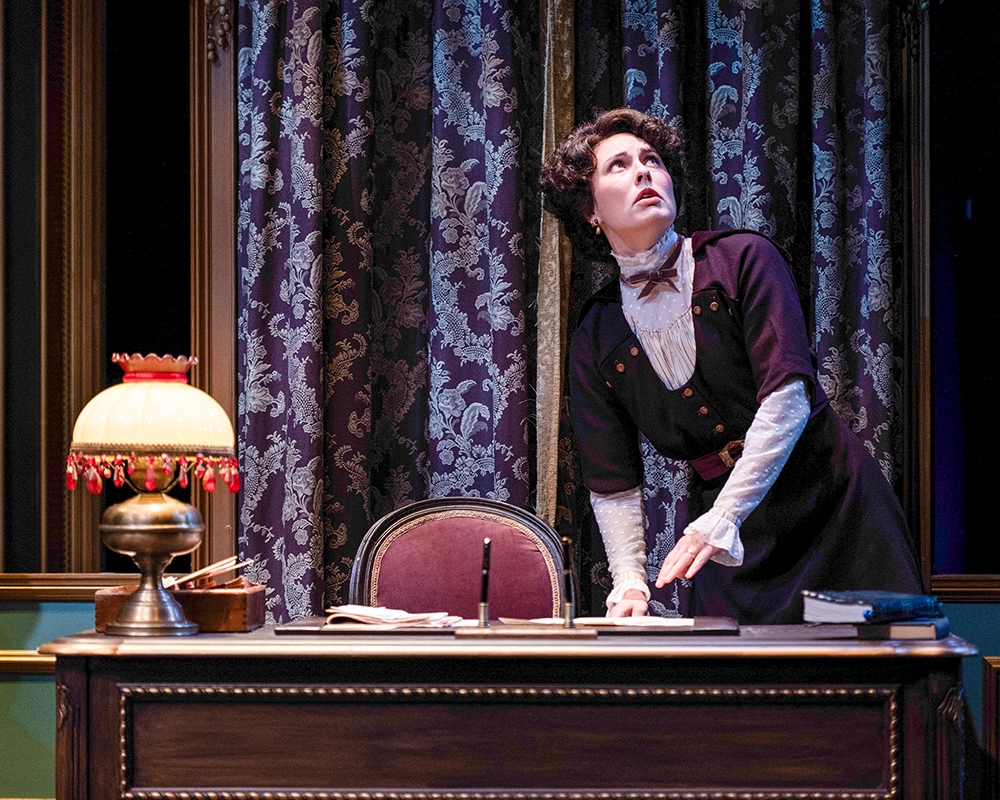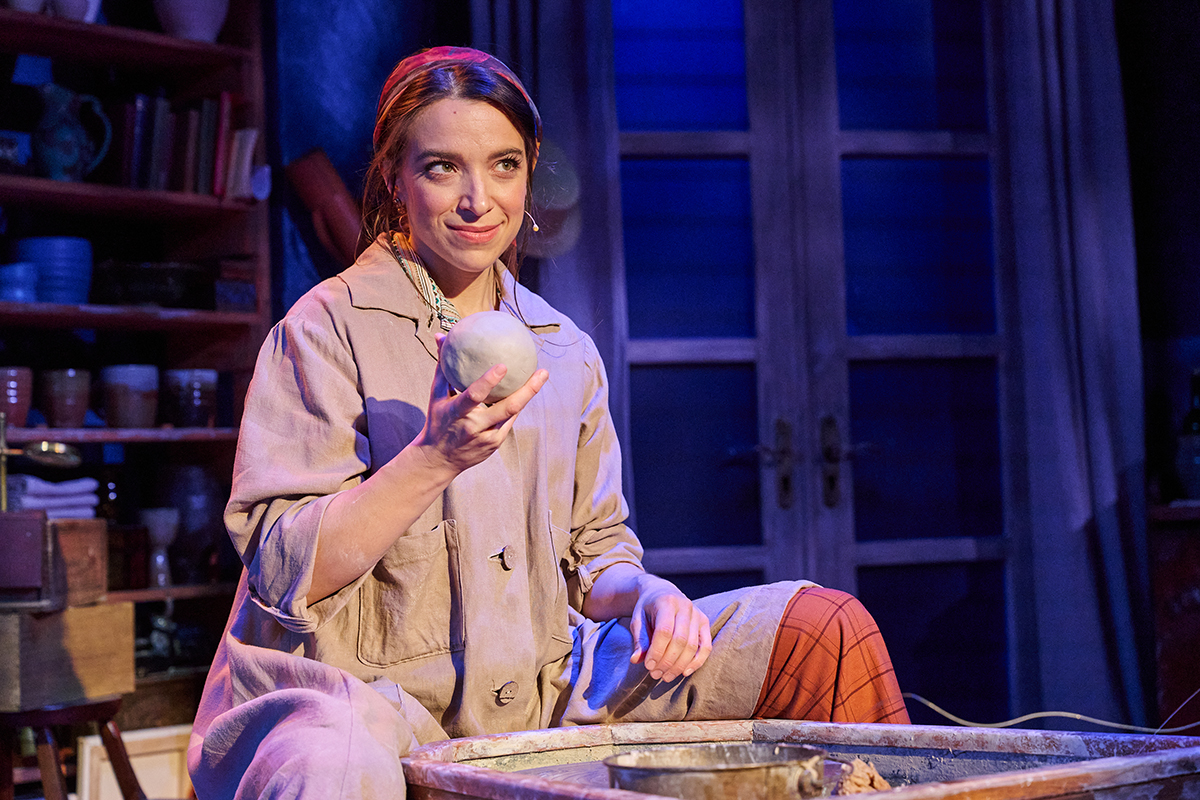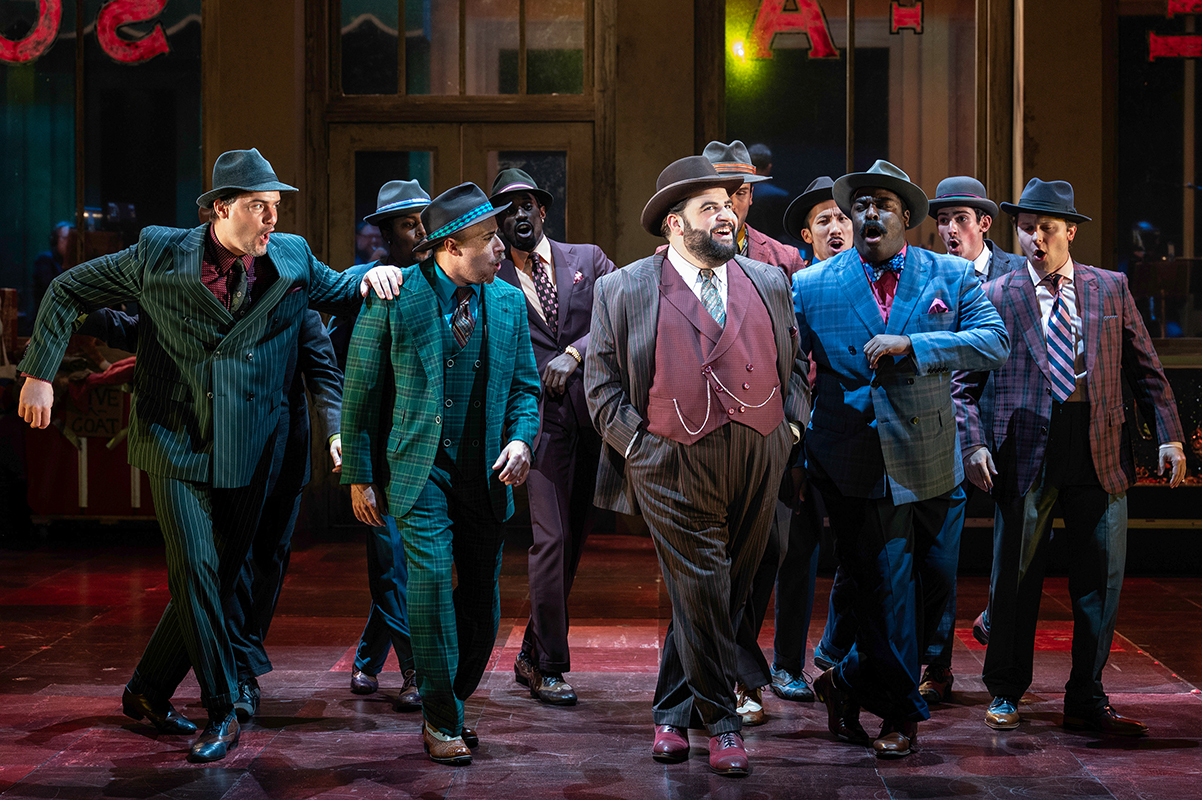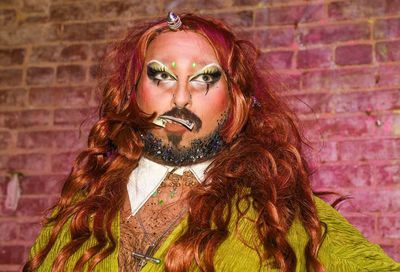‘Our Town’ Gets a Spectacular Broadway Revival
Thornton Wilder's classic American play, with a stellar cast led by Jim Parsons, digs deep and touches the soul.
By Ryan Leeds on October 23, 2024

By now, we’ve heard the lesson: Screentime is killing us. It’s made us less communicative with each other, more easily distracted, and more reliant on apps, maps, texts, tweets, posts, pokes, likes, loves, gifs, memes, and emojis of every type except the ones on real, live human faces.
TV shows, films, and theater have long spread these themes through much of their content, and when the world halted in 2020, storylines incorporating these themes of disconnection became even more potent and pervasive. It looks like Babs was right: People who need people really are the luckiest people in the world.
Yet it wasn’t the last 25 years of media, a global pandemic, nor even our favorite diva, Barbra Streisand, to remind us of the need for precious interwoven humanity. Long before they came along, we had playwright and novelist Thornton Wilder.
In 1938, his play Our Town premiered, first in Boston and later on Broadway, where it earned a Pulitzer Prize. Since then, numerous Broadway revivals have been mounted, and it has become a favorite option for schools, colleges, and community theaters around the world.
Currently, Kenny Leon and his gifted creative team have infused fresh life into the timeless story of small-town America in a Broadway revival starring Jim Parsons and a stellar cast of actors.
Not much happens in the fictional town of Grover’s Corners, a small enclave in New Hampshire “just across the Massachusetts line.” Parsons plays the nameless, everyman stage manager and serves as the town’s guide. Before introducing us to Dr. Webb (Billy Eugene Jones), his wife (Michelle Wilson), newspaper editor Mr. Webb (Richard Thomas), his wife (Katie Holmes), and both of their families, he gives us the layout of Grover’s Corners, finishing his description with “Nice town, y ‘know what I mean? Nobody very remarkable ever come out of it, s’far as we know.”
As Wilder intended, Parsons breaks the fourth wall, addressing both the audience and the inhabitants of this village. With a mere population of 2,640, according to Professor Willard (Shyla Lefner), it stands to reason that everyone knows one another. (Surprisingly for a small place, Our Town — with a cast of 27 — boasts one of the largest ensembles currently in a Broadway play).

Three acts comprise Our Town: “Everyday Life,” “Romance and Marriage,” and “Death and the Afterlife,” and we are told when the acts begin and end. Constantly, we’re made aware of the fact that we are watching a play, but it’s as though Wilder borrowed a page from Shakespeare’s notion that “all the world’s a stage, and all the men and women merely players.”
In this production — as in other stagings — the set is minimal, and there are few props. Wilder’s original intent was to “restore significance to the small details of life by removing the scenery. The spectator through lending his imagination to the action restages it inside his own head. In its healthiest ages, the theatre has always exhibited the least scenery.”
Sparse though it may be, Beowulf Boritt’s set, with its rustic walls and vintage hanging lanterns that softly illuminate the theater, is calm and contemplative, setting the tone for the entire show. It is a gentle and humbling reminder that Grover’s Corners is exactly like our own microcosmic communities: vital, but minute, under a sea of stars.
Our Town is a true ensemble piece. There is quiet restraint in all the cast’s actions and a stoic demeanor that suggests they will weather any storm that life throws their way. And although we are told that the story takes place in 1901, Leon throws in contemporary songs and opens the show with some cast members taking selfies of themselves. He’s also diversified this small town. These elements bring a modernity that cause us to see our own lives and communities.
Our Town is not the most dramatic work ever written — nor is this production. It isn’t supposed to be. Instead, it’s a reflection of common people doing common activities, living lives to the best of their abilities, and facing the challenges with a level-headed reality.
Towards the end, Emily Webb (Zoey Deutch) says, “Oh, earth, you’re too wonderful for anybody to realize you. Do any human beings ever realize life while they live it? – every, every minute?”
Perhaps that realization is often ignored or lost. What is not lost and fully realized is this stunning production that should make us grateful for the gifts of live theater and the people we most value — if only we’d look up from our phones.
Our Town (★★★★★) plays through Jan. 19, 2025, on Broadway at the Barrymore Theatre, 243 West 47th St. Tickets are $74 to $321. Visit www.ourtownbroadway.com.
Get our Broadway reviews delivered to your inbox. Subscribe to our free magazine and newsletter.
More from Metro Weekly:
Deceived Review: A Gothic Gaslighting Thriller at Everyman
Everyman Theatre’s reworking of Gaslight centers female agency, delivering compelling atmosphere and intrigue.
By André Hereford on December 16, 2025 @here4andre
Is willowy Londoner Bella truly going mad, or is her enigmatic husband Jack carrying out a devious plot to convince her she's losing her mind? And if so, to what end? In modern terms, Bella is desperately pondering whether Jack is trying to gaslight her into thinking she's going insane.
The terminology and the plot of Johnna Wright and Patty Jamieson's Deceived, now at Everyman Theatre, derive from Patrick Hamilton's Victorian thriller Gas Light, which premiered in 1938, before being adapted into the Oscar-winning 1944 film Gaslight, starring Ingrid Bergman as distressed newlywed Paula.
In Clay: A Revelatory One-Woman Musical at Signature Theatre
Boasting catchy tunes and a brilliant performance by Alex Finke, Signature’s "In Clay" shapes a fascinating portrait of an overlooked artist.
By André Hereford on December 22, 2025 @here4andre
Not since Hedwig and the Angry Inch have I so enjoyed a one-person musical about an internationally ignored female artist overshadowed by her famous male partner as much as I enjoyed Rebecca Simmonds and Jack Miles' enchanting In Clay.
Making its American premiere at Signature Theatre, following sellout runs in London, the jazz-infused portrait of early-20th-century French ceramicist and painter Marie-Berthe Cazin doesn't have too much else in common with hard-rocking Hedwig. Except that both shows are powered by a knockout batch of songs, and the galvanizing force of a woman reclaiming her time, her art, and her story.
Guys and Dolls at Shakespeare Theatre Company Is Showstopping
Francesca Zambello delivers lavish Golden Age spectacle, standout musical numbers, and big Broadway flair.
By Kate Wingfield on December 22, 2025
Putting aside the curious question of why the Shakespeare Theatre Company has taken to staging musical theater -- this season it's Guys and Dolls -- the happy news is that director Francesca Zambello doesn't need to keep her day job (although let's hope she does).
She may be the artistic director of the Washington National Opera, but she's clearly got the eye, ear, and vision for a whole different kind of crowd. This is no-holds-barred Golden Age rom-com song-and-dance magic brought fully to life with some serious spectacle. From scenic designer Walt Spangler's mind-blowing industrial shop space, with all its peeling paint and careworn shop décor, to a live orchestra conducted with complete and utter flair by James Lowe, it's something to behold.
Support Metro Weekly’s Journalism
These are challenging times for news organizations. And yet it’s crucial we stay active and provide vital resources and information to both our local readers and the world. So won’t you please take a moment and consider supporting Metro Weekly with a membership? For as little as $5 a month, you can help ensure Metro Weekly magazine and MetroWeekly.com remain free, viable resources as we provide the best, most diverse, culturally-resonant LGBTQ coverage in both the D.C. region and around the world. Memberships come with exclusive perks and discounts, your own personal digital delivery of each week’s magazine (and an archive), access to our Member's Lounge when it launches this fall, and exclusive members-only items like Metro Weekly Membership Mugs and Tote Bags! Check out all our membership levels here and please join us today!
The Magazine
-
Most Popular
 University of Oklahoma Fires Transgender TA Who Failed Student
University of Oklahoma Fires Transgender TA Who Failed Student  Most Sniffies Users Aren’t Gay, New Data Shows
Most Sniffies Users Aren’t Gay, New Data Shows  Jonathan Bailey Is 2025’s Highest-Grossing Actor
Jonathan Bailey Is 2025’s Highest-Grossing Actor  Where to Ring in the New Year in Gay D.C.
Where to Ring in the New Year in Gay D.C.  Jacob Dickey Comes Up Lucky as Sky Masterson
Jacob Dickey Comes Up Lucky as Sky Masterson  “Femboy” Tops PornhubGay Searches in 2025
“Femboy” Tops PornhubGay Searches in 2025  The 10 Best Movies of 2025
The 10 Best Movies of 2025  Texas Launches "Tip Line" to Target Trans Restroom Use
Texas Launches "Tip Line" to Target Trans Restroom Use  In Clay: A Revelatory One-Woman Musical at Signature Theatre
In Clay: A Revelatory One-Woman Musical at Signature Theatre  Erik Bottcher Drops Congressional Bid for State Senate Run
Erik Bottcher Drops Congressional Bid for State Senate Run
 University of Oklahoma Fires Transgender TA Who Failed Student
University of Oklahoma Fires Transgender TA Who Failed Student  Jonathan Bailey Is 2025’s Highest-Grossing Actor
Jonathan Bailey Is 2025’s Highest-Grossing Actor  Nicki Minaj Reaffirms Anti-Trans Views at Turning Point USA Event
Nicki Minaj Reaffirms Anti-Trans Views at Turning Point USA Event  Where to Ring in the New Year in Gay D.C.
Where to Ring in the New Year in Gay D.C.  Barry Manilow Reveals Lung Cancer Diagnosis
Barry Manilow Reveals Lung Cancer Diagnosis  The 10 Best Movies of 2025
The 10 Best Movies of 2025  Most Sniffies Users Aren’t Gay, New Data Shows
Most Sniffies Users Aren’t Gay, New Data Shows  Jacob Dickey Comes Up Lucky as Sky Masterson
Jacob Dickey Comes Up Lucky as Sky Masterson  Guys and Dolls at Shakespeare Theatre Company Is Showstopping
Guys and Dolls at Shakespeare Theatre Company Is Showstopping  Erik Bottcher Drops Congressional Bid for State Senate Run
Erik Bottcher Drops Congressional Bid for State Senate Run
Scene
Metro Weekly
Washington's LGBTQ Magazine
P.O. Box 11559
Washington, DC 20008 (202) 527-9624
About Us pageFollow Us:
· Facebook
· Twitter
· Flipboard
· YouTube
· Instagram
· RSS News | RSS SceneArchives
Copyright ©2025 Jansi LLC.














You must be logged in to post a comment.